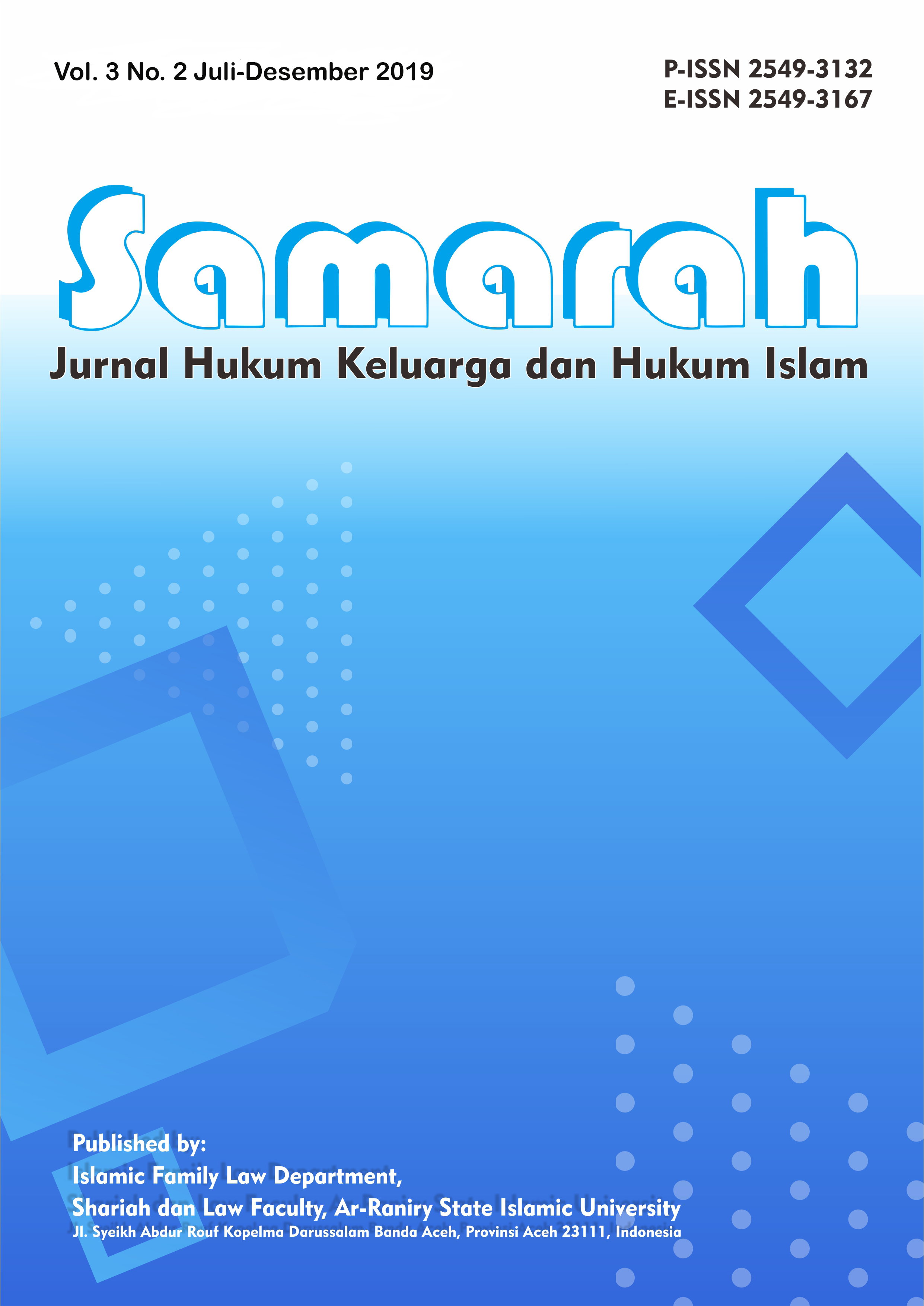Hak Waris Pemohon Euthanasia Pasif menurut Hukum Islam: Studi tentang Maqāṣid al-Syarī‘ah (Birthright of Passive Euthanasia Applicants according to Islamic Law: Study of Maqāṣid al-Syarī'ah)
DOI:
https://doi.org/10.22373/sjhk.v3i2.4386Keywords:
Birthright, euthanasia passiveAbstract
Such rapid development of science and technology lately resulted in such rapid changes in the social life of the human culture, one of which is medical field. But although there has been no progress there may be some problems that have not been solved by human beings, such as the discovery of drugs or a potent bidder to cure deadly diseases such AS AIDS, cancer, and other malignant diseases. These deadly diseases are a reason for someone to end his life from having to endure a long time ill one of them by asking for family assistance to end his life, which in medicine is called euthanasia. This research aims to determine how the position of passive euthanasia and birthright position for applicants of euthanasia passive according to Islamic law when viewed in terms of maqāṣid al-Syarī'ah. This research is done by collecting the library materials in the form of books, encyclopedia, and scientific works related to this discussion. The results of this study gave the answer that stopping the treatment, or releasing the organ and respiratory aids from the sick or euthanasia passive the law may but only in the case of the sick suffer the death of the brainstem. Because while using these tools is contrary to sharia teachings among them, postponing the management of dead and its funeral without emergency reasons, postponing the division of inheritance and resigning the time of his wife. Therefore, the birthright position for the heir or the family that asks or plea for passive euthanasia is not hindered by the heir. Because the passive euthanasia in this case is not classified as an act of murder.
References
A. Hamid Sarong, dkk , Fiqh, (Banda Aceh: PSW IAIN Ar-Raniry, 2009.
Abdul Aziz Dahlan, Ensiklopedia Hukum Islam, Jakarta: Ichtiar Baru van Hoeve, 2000.
Abu Malik Kamal ibn as-Sayyid Salim, Fikih Sunnah Wanita, Jakarta: Qisthi Press, 2014.
Ahmad bin Ali bin Hajar, Fatḥ al-Bārī, Kairo: 1987,Cetakan pertama, Darul Bayan lit-Turas.
Ahsin W. Alhafidz, Kamus Fiqh, (Jakarta: Amzah, 2013.
Amir Syarifuddin, Hukum Kewarisan Islam, Jakarta:Kencana, 2004.
Andi Hamzah, KUHP dan KUHAP, Jakarta: Rineka Cipta, 2014.
As’ad Sungguh, Kode Etik Profesi Tentang Kesehatan, Jakarta: Sinar Grafika, 2014.
Departemen Pendidikan Nasional, Kamus Besar Bahasa Indonesia, Edisi ke Tiga, Jakarta: Balai Pustaka, 2002.
Gamal Achyar, Panduan Praktis Pembagian Warisan dalam Islam, (Banda Aceh: 2016.
Jaseer Auda, Membumikan Hukum Islam Melalui Maqasid Syariah, (terj. Rosidin dan ‘Ali ‘Abd el-Mun’im), Bandung: Mizan Pustaka, 2015.
Muhammad Jawad Mughniyah, Fikih Lima Mazhab, Jakarta: Lentera Basritama,2001.
Sayyid Sabiq, Fiqih Sunnah, (terj.mujahidin muhayan), (Jakarta: Tinta Abadi Gemilang, 2013.
Syamsul Rizal Hamid, Buku Pintar Agama Islam, Bogor: LPKAI Cahaya Islam, 2008.
Syamsul Rizal Hamid, Buku Pintar Agama Islam, Bogor: LPKAI Cahaya Salam, 2008.
W.A. Newman Dorland, Dorland’s Illustrated Medical Dictionary 31 Editions (terj. Ratna Neary Elseria,dkk), Jakarta: Buku Kedokteran EGC,2007.
Wahbah Az-Zuhaili, Fiqih Islam Wa Adillatuhu Jilid 10, (terj. Abdul Hayyie Al-Kattani,dkk), Jakarta:Gema Insani,2011.

Downloads
Published
Issue
Section
License
Authors who publish in Samarah: Jurnal Hukum Keluarga dan Hukum Islam agree to the following terms:
- Authors retain copyright and grant the journal right of first publication with the work simultaneously licensed Attribution-ShareAlike 4.0 International (CC BY-SA 4.0) that allows others to share the work with an acknowledgment of the work's authorship and initial publication in this journal.
- Authors are able to enter into separate, additional contractual arrangements for the non-exclusive distribution of the journal's published version of the work (e.g., post it to an institutional repository or publish it in a book), with an acknowledgment of its initial publication in this journal.
- Authors are permitted and encouraged to post their work online (e.g., in institutional repositories or on their website) prior to and during the submission process, as it can lead to productive exchanges, as well as earlier and greater citation of published work. (See The Effect of Open Acces)









